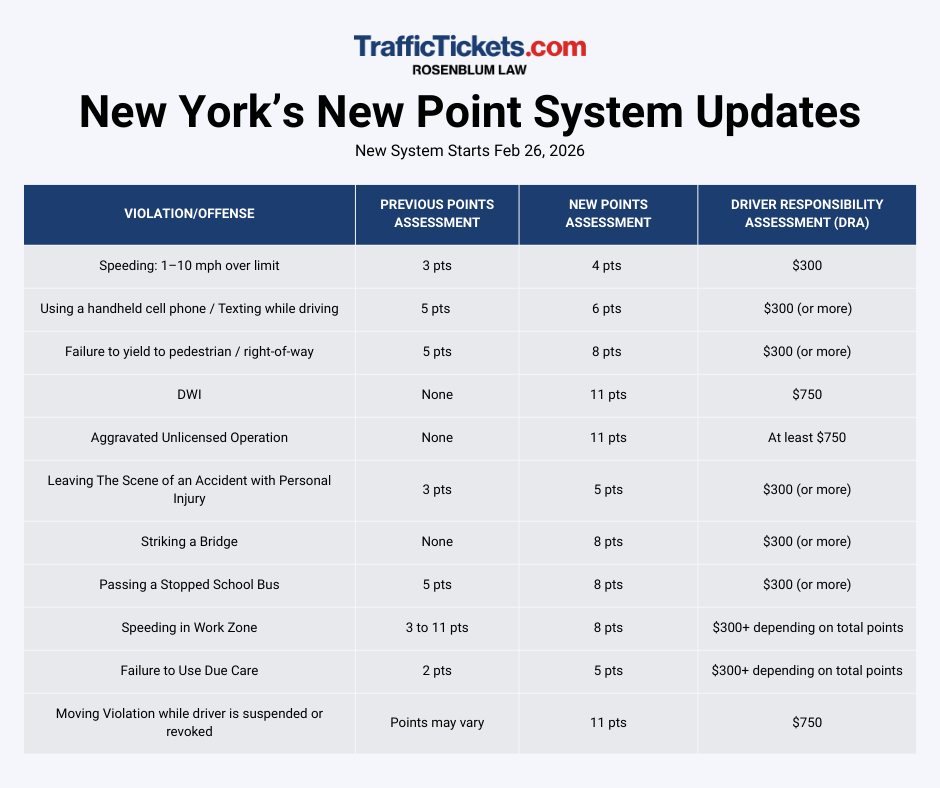The New York DMV published sweeping changes to the point system on November 6, 2024, marking one of the most significant overhauls in decades. These changes impact how points are assessed, the penalties for violations, and the rules for suspensions and license restoration. Drivers convicted of DWI offenses now face 11 points, and offenses like speeding in construction zones now carry 8 points, regardless of the speed, making it easier to lose driving privileges and harder to restore them. The reforms also raise the penalty for passing a stopped school bus to eight points, and drivers who accumulate four or more alcohol‑ or drug‑related convictions will now face permanent license revocation.
New York’s overhaul is not a minor policy tweak — it is the most aggressive tightening of driving penalties the state has ever implemented. Even one ticket that used to be considered routine can now result in license suspension.
— Adam H. Rosenblum, Esq.
These updates are not only extensive but, in some cases, unclear. Questions remain about how certain aspects of the new system will be implemented, particularly with regard to the look-back period and administrative processes. Rosenblum Law is closely monitoring updates, cases, and studies on the changes to ensure drivers are fully informed and prepared to defend their licenses.
What is clear, however, is that it is now more important than ever to fight New York traffic tickets. If you have received a ticket recently, contact Rosenblum Law traffic attorneys for a free consultation.
What Are the Changes?
The changes to the New York point system make it easier for the DMV to suspend a driver’s license while introducing additional challenges for those attempting to restore suspended licenses. Here is a comprehensive summary of the updates.

Who Is Most at Risk Under the New Point System?
The new rules significantly increase the number of drivers who may face suspensions, hearings, or mandatory programs. Those most at risk include:
- Drivers with several minor violations — previously “zero-point” or low-impact tickets now carry 1–3 points.
- Drivers who rely on zero-point plea deals — prosecutors are expected to offer fewer of them under the new framework.
- Commercial drivers (CDL holders) — point accumulation affects both driving privileges and federal employment requirements.
- Drivers who frequently travel through construction zones — every violation now triggers an automatic 8-point penalty.
- Young and junior drivers — youthful-offender protections do not prevent point-based administrative actions.
Changes to the Look-Back Period
The look-back period for assessing points has been extended from 18 months to 24 months. This means violations from up to two years ago can now contribute to license suspension or Driver Responsibility Assessment (DRA) penalties.
- Likely Retroactive: According to Newsweek, Legal experts now expect the 24‑month look‑back period to apply to violations that occurred before the new rules take effect. This extended window will likely lead to more suspensions and additional Driver Responsibility Assessment fees.
- Increased DRA Penalties: More chances to get more points means more drivers will become liable for the DRA penalty, which remains at $100 per year for the first 6 points and $25 per year for each additional point, payable annually.
The retroactive impact of this system is likely to catch drivers off guard. Many will be surprised to learn that older tickets may still count toward new penalties once the DMV’s updated platform becomes fully operational.
Speeding in Construction Zones
One of the most notable changes is the introduction of 8 points for speeding in construction zones, regardless of the driver’s speed over the limit.
- Old System: Previously, construction zone violations followed the same point structure as standard speeding tickets, ranging from 3 to 11 points depending on how far over the limit the driver was going.
- New System: Now, any speeding violation in a construction zone—whether it’s 1 mph or 40 mph over the speed limit—will automatically result in 8 points. This change reflects the DMV’s heightened focus on deterring risky driving in high-danger areas.
This elevated penalty makes speeding in construction zones one of the most heavily penalized moving violations, second only to offenses like DWI or driving with a suspended license.
DWI and Alcohol/Drug-Related Offenses
Another significant update involves alcohol and drug-related offenses, which now carry 11 points in addition to existing administrative penalties. Drivers with four or more alcohol‑ or drug‑related convictions will no longer merely face multiple suspensions; the new rules authorize the DMV to permanently revoke their license.
Offenses affected include:
- Driving While Intoxicated (DWI)
- Driving While Ability Impaired (DWAI)
- Aggravated DWI
- Driving While Ability Impaired by Drugs (DWAI-Drugs)
- First-Time Offenses: The 11 points for first-time DWI-related convictions will not count toward the look-back period for suspension purposes, but administrative penalties (e.g., automatic license suspension) still apply.
- Repeat Offenses: For repeat offenders, the 11 points can lead to multiple suspensions and higher penalties.
- Driver Responsibility Assessment Fee (DRAF): A DWI conviction now triggers a $750 DRAF. Repeat offenders may face a combined total of $1,425 in penalties if both the DRA for points and the DWI-related DRAF are assessed.
Major Increases for AUO and Violations Committed While Suspended
One of the most significant — and least understood — changes in the new point system involves Aggravated Unlicensed Operation (AUO) and violations committed while a driver’s license is suspended.
These offenses now carry far higher point values and far more serious consequences than ever before:
- Aggravated Unlicensed Operation (AUO):
AUO now carries 11 points, placing it in the same category as the most severe offenses, including DWI and drug-impaired driving. A single AUO conviction can immediately trigger a suspension hearing under the new system. - Driving While Suspended (other violations committed during suspension):
Any moving violation committed while a license is suspended now carries significantly elevated penalties. The DMV is categorizing these offenses as high-risk behavior, and many of them now add 5 or more points to a driver’s record instantly.
Why This Matters
These increases mean that drivers who are already suspended — even for administrative or unpaid-ticket reasons — face a dramatically heightened risk of:
- Immediate suspension hearings
- Permanent revocation in certain repeat cases
- Substantial fines
- Insurance cancellations or non-renewals
New Point Value Assessments
Some violations that previously carried no points now have significant penalties.
- Aggravated Unlicensed Operation (AUO): 11 points.
- Facilitating Aggravated Unlicensed Operation (AUO): 5 points.
- Speed Contests or Races: 5 points.
Changes to Point Values
Several violations now have updated point assessments:
| Violation | Points | Change |
| Driving Under the Influence (DWI) | 11 | New |
| Passing a Stopped School Bus | 8 | Up from 5 |
| Speeding in a Construction Zone | 8 | New |
| Failure to Exercise Due Care | 5 | Up from 2 |
| Leaving the Scene of a Personal Injury Accident | 5 | Up from 3 |
Offenses like speeding, reckless driving, and railroad crossing violations remain unchanged but continue to carry significant penalties.
Changes to Administrative Action
Drivers with accumulated points will now face a stricter administrative process.
- Earlier Warning Letters: Drivers who accumulate 4–6 points in a 24‑month period will receive an early warning letter.
- Mandatory Driver‑Improvement Clinic: Drivers with 7–10 points must complete a driver‑improvement clinic, a program separate from the voluntary defensive‑driving course.ivers with 7 to 10 points must attend a Driver Improvement Clinic.
- Suspension Hearings: Drivers must attend a formal hearing if they accumulate 11 or more points within 24 months or meet other thresholds; at the hearing, the DMV will determine whether to suspend the license.
Drivers may also face a formal hearing if they are charged with three or more violations in a short period, even if they have not reached the point threshold. However, enforcement of this rule may be inconsistent due to administrative backlogs.
IT System Delays
Although the rules took effect on Nov. 6, 2024, the DMV’s modernization project means the revised point system will not be fully enforced until mid‑February 2026, when the new technology platform goes live.
How the New Rules Affect Real Drivers: Examples
To illustrate how the extended look-back period and new point values work in practice, here are several real-world scenarios:
Example 1: Stacked Minor Violations
A driver receives a 4-point speeding ticket in January. Twenty months later, they receive a 5-point “Failure to Yield to a Pedestrian” ticket. Under the old rules, these violations would not overlap. Under the new 24-month look-back, the driver now has 9 points—triggering a mandatory Driver Improvement Clinic.
Example 2: Construction Zone Penalty
A driver going just 1 mph over the limit in an active construction zone receives an automatic 8-point violation. This single ticket places them only 2 points away from a suspension hearing.
Example 3: Equipment + Moving Violation Combo
A driver is stopped for driving with an obstructed windshield, which now carries 1 point, and is also issued an improper U-turn violation, which carries 2 points under the updated system. Previously, both of these were considered low-level, non-point violations. Today, the driver leaves the encounter with 3 points, placing them within the new warning-letter range and increasing their insurance risk.
Financial Impact: Insurance Increases and Hidden Costs
The new point system has major financial consequences for drivers:
- Insurance Premium Spikes: Insurance companies may increase premiums significantly—and in some cases cancel or non-renew policies—after a single 8-point conviction, such as speeding in a construction zone.
- Higher Fines to Avoid Points: Legal experts anticipate that many drivers will pay much higher fines to secure zero-point or reduced-point plea offers, which prosecutors are now less willing to provide.
- More Drivers Triggering DRA Fees: Because more violations now carry points, significantly more drivers will fall into Driver Responsibility Assessment (DRA) obligations at 6 points and higher, increasing their financial burden for three years.
Together, these hidden costs can easily exceed a thousand dollars per incident—making legal representation far more important.
Fewer Zero-Point Plea Options
For years, many drivers relied on zero-point plea bargains—especially for speeding and cell-phone violations. Under the new point system, prosecutors are expected to offer far fewer zero-point outcomes because:
- Many previously “non-point” violations now carry points by default.
- Prosecutors have less flexibility due to mandatory administrative actions tied to point totals.
- The DMV’s goal is to reduce plea deals that help drivers avoid suspensions.
As a result, drivers should never plead guilty online without speaking to an attorney first.
Conclusion
These new point system rules will impact many New York drivers, particularly those with serious offenses like driving while suspended, DWI or speeding in construction zones. The automatic 8-point penalty for construction zone speeding creates significant risks for drivers, even for minor infractions, while the extended look-back period could catch drivers off guard.
It is now more critical than ever to fight traffic tickets in New York. Rosenblum Law traffic attorneys are highly experienced in navigating New York’s traffic courts and can help drivers avoid costly penalties. Contact us today for a free consultation.




